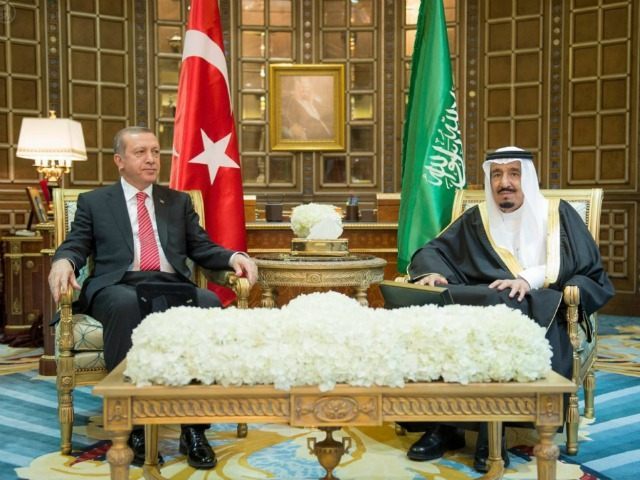Sources within the Turkish government claim Ankara has planned to hold a joint military drill with Saudi Arabia, a move that could chill diplomatic relations with Saudi Arabia’s regional rival, Iran. Turkey’s state-run Anadolu News Agency is denying the report.
Defense News reports that a “senior diplomat in Ankara” has confirmed the two predominantly-Sunni countries will hold a joint military drill to “cooperate against common threats.” The exercises, the source claimed, “do not particularly aim at any specific target.”
Turkey’s Hurriyet newspaper reported a similar story from sources, claiming that the move was intended to “strategically cooperate against common threats,” and the two parties had agreed to such a drill at a meeting in Riyadh. Turkey President Recep Tayyip Erdogan visited Riyadh in December, where it is believed he discussed the ongoing civil war in Syria with Saudi King Salman. Erdogan said the two were working “in solidarity and consultation” on finding a political solution to the Syrian crisis. Hurriyet notes that, more recently, Turkish Chief of General Staff Hulusi Akar and Prime Minister Ahmet Davutoglu visited Saudi Arabia in late January.
Anadolu Agency, run by the government of Turkey, has denied the joint drills, Hurriyet notes. A senior Turkish official denied another rumor circulating that the drills were related to Saudi Arabia’s call for the creation of a 34-nation “Islam army” to protect the region from threats such as the Islamic State and Shiite militias, particularly in Yemen.
“The togetherness that is being mentioned [by Saudi Arabia] cannot actually be called an ‘Islam army.’ Even if there is such an initiative, Turkey will not be a part of its military branch,” a senior Turkish official said.
Such a move would call into question Turkey’s cordial relationship with Iran. Iran has intervened in the Syrian civil war on behalf of dictator Bashar al-Assad, while this week, Saudi Arabia threatened to send ground troops to Syria to fight the Damascus forces. Erdogan visited Tehran most recently in April, opting not to discuss the situation in Syria or Yemen, where Iran has intervened to aid Shiite Houthi rebels in its quest to overthrow the government of Sanaa, now relocated to southern Aden city.
Instead, the Turkish delegation opted to discuss business. “Turkey is the most prepared country for Iran to be free of sanctions, for Iran’s economy to normalize,” Turkish Economy Minister Nihat Zeybekci said during the trip.
Speaking to Hurriyet, Iranian Deputy Foreign Minister Ibrahim Rahmanpour said his nation was “not concerned” about Turkey, though he warned Ankara against relations with Saudi Arabia: “Be cautious! Do not bet on the loser.” He added that Iran believes Turkey will take “the Iranian stance and interests into account while undertaking such initiatives,” but Iran would wait for any confirmation before reacting to the news of any joint military drills. “We should wait and see whether this cooperation [between Turkey and Saudi Arabia] will be really put in place or whether they are only news stories.”
Of Saudi Arabia’s claim it is ready to send ground troops to Syria, Rahmanpour said it was “propaganda and show.”
“This statement of Saudi Arabia is just to create an expectation among these fighters and not to leave Syria,” he said, claiming Saudi Arabia has been commissioning foreign fighters to battle Assad in Syria. Iran has been confirmed to do the same: recruit impoverished Afghan refugees to fight and die for Assad’s regime.
Erdogan’s government vehemently opposes Assad and has renewed his call this week for a no-fly zone in Syria. Erdogan has done so amid extensive Russian airstrikes, most not targeting the Islamic State. Russia is believed to be employing cluster bombs in the effort, which have a high civilian fatality rate. Russia has repeatedly vetoed attempts within the United Nations Security Council to create “safe” or “no-fly” zones in Syria.
Russian officials have begun talks with the United States in Munich on how best to resolve the crisis. U.S. Secretary of State John Kerry and Russian Foreign Minister Sergey Lavrov are meeting, along with less-senior officials, to discuss the possibility of a ceasefire in the region. Russia is calling for a ceasefire to begin on March 1.

COMMENTS
Please let us know if you're having issues with commenting.